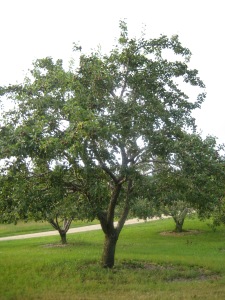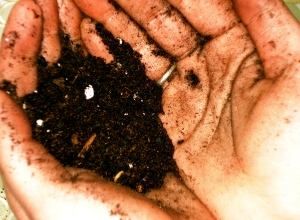You are currently browsing the tag archive for the ‘food consumption’ tag.
Isaiah 55:1-9 • Psalm 63:1-8 • 1 Corinthians 10:1-13 • Luke 13:1-9
“Listen, so that you may live.”
God offers abundant life to us all. “Everyone who thirsts, come to the waters; and you that have no money, come, buy and eat!” However, we sometimes choose un-life, life “lite,” almost life. In our desire for “more,” we end up choosing less. Obsessed with making fluffier, identical loaves of bread, we bleach flour of its nutrients; in making “more” grain to make “more” bread, we genetically modify our wheat. “Why do you spend your money for that which is not bread, and your labor for that which does not satisfy?” Instead of giving our money for bread “lite,” God calls us to feast and delight ourselves in “rich food.” Instead of relegating the labor of creating “almost bread” to lab technicians and machines, perhaps God calls us each to seek the satisfaction that comes from our own labor.
The passage from Isaiah does not simply commend us to make better decisions at the grocery store, to make our own bread or grow our own gardens. God beckons us, “Incline your ear, and come to me; listen, so that you may live.” Abundant life does not simply come from a good loaf of bread, but rather comes from intimate relationship with God, which God establishes in holy covenant with us. Only in deeply listening to God will we hear the promptings of the Holy Spirit, as we attempt to live in harmony with the rhythm of the seasons and in caring relationship with our sisters and brothers.
Until we invite God’s ways and thoughts into conversation with our own, we will continue to wallow in our “almost life.” We will continue to eat bread which leaves our bodies wanting, which leaves our fields wanting.
As Derek noted last week, the whole of creation is hoping, groaning, left wanting – for its own fulfillment. As in Jesus’ parable of the young fig tree which had not yet borne fruit, we heed the words of the gardener to wait awhile longer while he puts manure down.
While we hope for God’s fulfillment of God’s purposes in creation, we listen intimately to God, we celebrate those places where we see glimpses of that fulfillment (in mature trees bearing fruit, in loaves of nutritious bread), and we do the good work to which God calls us. We lay down the manure, we advocate for grocery stores to be built in “food deserts,” we build community gardens. All this, so that we may echo God’s words, “Everyone who thirsts, come to the waters; and you that have no money, come, buy and eat!”
Practice
We hope that you are finding the nourishment you need to continue the practice(s) you have taken up these 40 days of Lent, and we pray that your practices are nourishing you and your relationship with God and others.
Some new ideas for practices to take up this week, or later on:
- Create your own “manure” of sorts, by saving your kitchen’s fruit and vegetable waste, grass clippings, and leaves, and beginning a compost bin. Compost bins need not be complicated, expensive, smelly, nor must you have outdoor space (you can buy boxes of worms to do the job for you inside!).
- “You that have no money,” try out dumpster diving. Make a dash to the grocery store, bakery, or restaurant as they’re closing and taking out the trash (or any other time), and check out the bags stuffed with just-expired items.
- Advocate for grocery stores to be established in food deserts. Food Security Partners of Middle Tennessee (link to the left) is running a campaign called “Re/Storing Nashville.” There, you can share your own “grocery story.”
- Buy a loaf of nourishing bread at a local bakery such as Great Harvest.
- Start a garden where you live, or help out with a community garden. They’re popping up all around Nashville.
Prayer
(from The Evangelical Reformed Churches in German-speaking Switzerland, 1972)
Lord, you love life; we owe our existence to you. Give us reverence for life and love for every creature. Sharpen our senses so that we shall recognize the beauty and also the longing of your creation, and, as befits your children, treat our fellow creatures of the animal and plant kingdoms with love as our brothers and sisters, in readiness for your great day, when you will make all things new.
Amen.
Authored by Jessica Bridges on behalf of Eco-Concerns
Readings for Ash Wednesday:
Joel 2:1-2, 12-17 or Isaiah 58:1-12
Remembering our Finitude, Finding a Source of Hope
Remember, from dust you have come and to dust you shall return.
Ash Wednesday marks the start of the season of Lent: a time of almsgiving, fasting, and prayer to ready ourselves for the coming of Easter. It is a solemn time, for we are reminded of our finitude. We are reminded that, as finite creatures, our actions and intentions often amount to little.
In this short period of time we have on Earth, we want to be useful and helpful. Especially when we see the devastation that our Earth endures, we want even to save the world. Yet, more often than not, we become impediments to the world’s restoration: our best efforts fail or become diverted from their purpose. Or worse, when faced with the contradiction of our best efforts and our inevitable failures, we begin to lose hope.
Becoming “stuck” on the bigness of it all, we lose our ability to become present in the moment. We forget that our Christian practice is–even in its best iterations–not meant to “save the world.” Rather, our Christian practice is one of loving the world. Our mission is not to save the world, but to love it as Christ has loved it. From seed to tree, from mountain top to ocean current, part of what it means to be Christian is to love the world that God creates anew each day.
Ironically, we find that, in loving the world, little by little, we become unstuck from its bigness and can instead focus our practice on the seemingly insignificant things that do matter.
In today’s Gospel reading, we hear Jesus telling his followers to be private in their almsgiving, fasting, and prayer. We hear Jesus telling us not to become caught up in the outward appearance of our spiritual practices. Do not blow trumpets, calling attention to yourself and your own goodness, but quietly and steadfastly bear witness to the goodness of God’s justice that is coming.
And we know that it is coming. On the other side of Lent, we know the joy of Easter that simultaneously promises and participates in the coming of God’s Kingdom. Knowing that we come from dust and to dust we shall return does not stop us from proclaiming the exuberance of the resurrection.
But let us not get ahead of ourselves: though we look forward to the resurrection, let us not forget that we must be present throughout the slow season of Lent, or that we must also bear through the Cross on Good Friday. Recalling that we shall return to dust reminds us of our finitude, but also of our context. The basic and mundane contexts of our lives is where transformation takes place. In the dust and dirt of our existence, we see hope for the restoration of the world.
Practice
Part of the season of Lent includes practices that help prepare us for Easter. Some of us fast from some luxury such as meat, chocolate, sodas, or alcohol; others of us take on practices such as calling our families more often, giving to a charity, or embarking on disciplined prayerful contemplation. Perhaps you have already decided what you will practice this Lent; perhaps you have not.
Almsgiving, praying, and fasting are traditional forms of Christian practice. Viewed through an ecological lens, these practices take on new meanings.
Here is a brief list of suggestions.
Almsgiving
- Pay carbon offsets to your local power company to encourage more sustainable forms of energy.
- Reduce your dependence on material goods (and the stripping of natural resources that their production requires) by donating up to one half of your wardrobe to Goodwill, either all at once or a few items each week.
- Join a CSA (Community-Supported Agriculture) group to support local farmers, while at the same time getting fresher, more seasonal vegetables to your table.
- Become a member of an environmental advocacy group, either through donating financially or by volunteering your time.
- Donate your Saturdays to a community garden.
Praying
- Practice daily devotional readings, searching for ways that the Scripture may enhance, deepen, or illuminate how you see the Earth and your relationship to nature.
- Seek out daily activities that can become occasions for prayer: driving your daily commute without heat or air to cut down on the amount of gasoline used, doing the dishes with less water, brushing your teeth without the sink running: to come to understand this activity’s intricate connection to the environment.
- Pray for the restoration of the environment, particularly that mountaintop removal be stopped and that God’s mountains and the people who live on them recover from decades of destruction.
Fasting
- Cattle farming and other commercial forms of meat production often use more resources (such as water) than farming beans or vegetables. Fasting from meat during the season of Lent can have a great impact on the amount of resources being used to bring your meal from the farm to your table.
- Find ways to cut back your daily commute: carpool one day a week, or walk or bike to your daily activities (where possible).
- Reduce the number of times per week that you and your family eat out. Fasting in this simple way also means that you take on making more meals at home. Becoming committed to more home-cooked meals may also increase one’s appreciation for the work involved in sustaining our bodies.
- If you do go out to eat, bring your own reusable tupperware–fast from the environmentally harmful clamshell containers that have become a staple of our dining culture.
- Start a carbon-fast at home: replace incandescent bulbs with CFL bulbs, either all at once or a few each week.
- Fast from buying bottled water. Instead, reuse your most recent plastic bottle for the 40 days of Lent.
Prayerfulness
We invite you to take this simple prayer* with you throughout the week. May it remind you that the ground, praised as holy, is the same ground to which we as mortal creatures will return. It is the same ground to whose restoration our daily practices witness.
Holy is the soil we walk on,
Holy everything that grows,
Holy all beneath the surface,
Holy every stream that flows.
* Prayer written by Edmund Banyard (quoted in Earth Gospel by Sam Hamilton-Poore).


